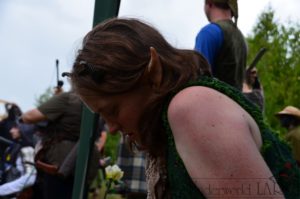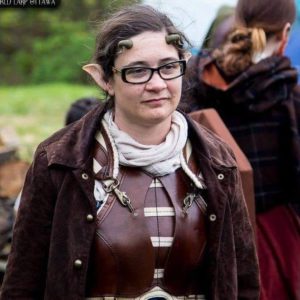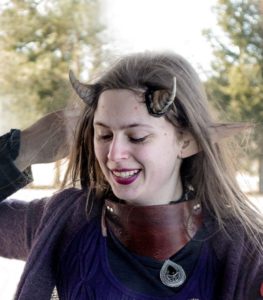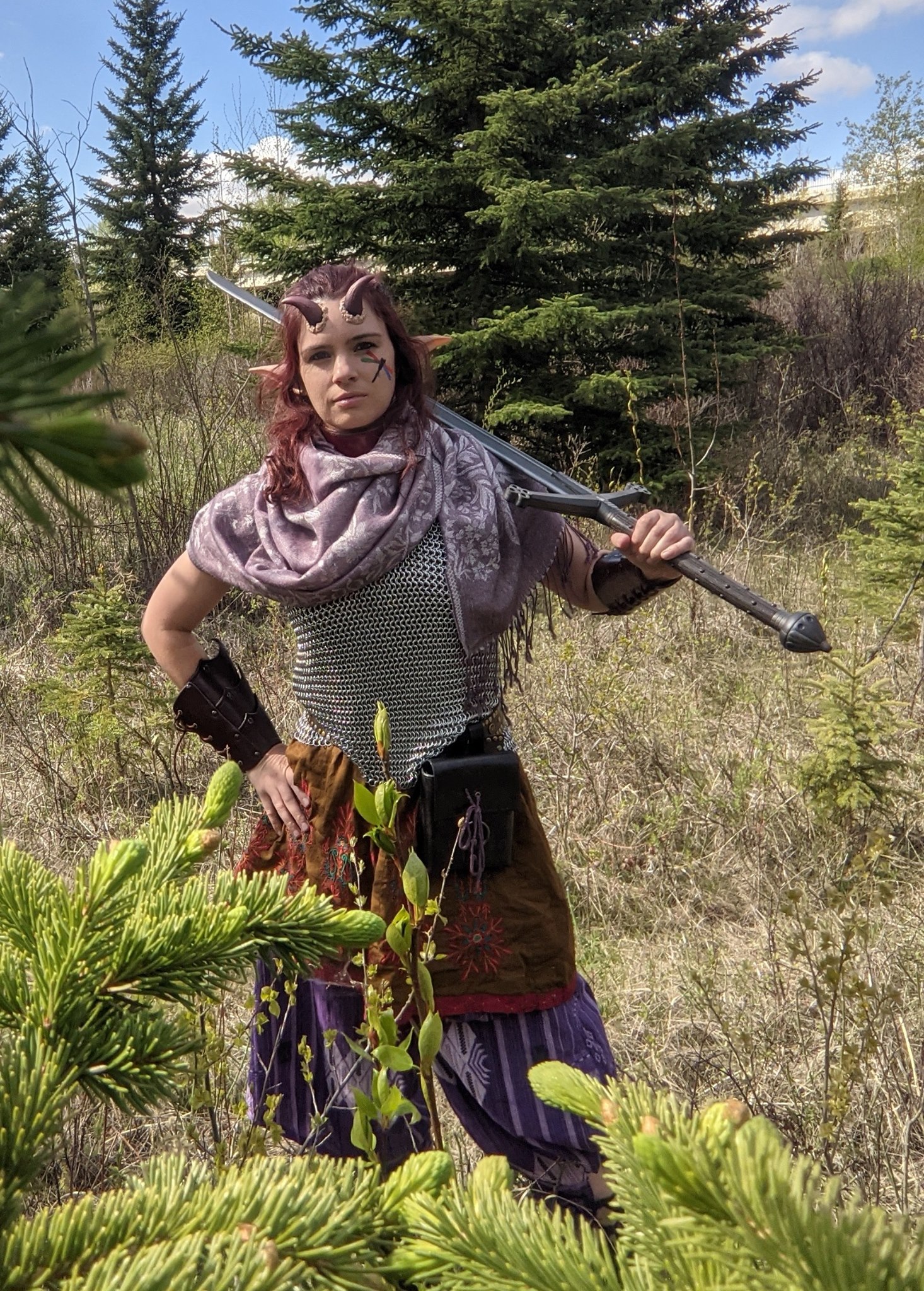Wood Fae
Distant cousins to the Faerie folk, Wood Fae, known to themselves as Na Daoine, pronounced “Na Deen-uh”, are rumoured to have been born of magic within the forests of the world. This may account for many of the Wood Fae having an affinity to natural creatures. Quite contrary to their Fae folk cousins, the Wood Fae have an extreme dislike for all forms of charms and will go to nearly any length to oppose mind-altering spells or effects. They are not only averse to practicing charming magic themselves, but are even able to remove charming effects from others. Their capital resided on the Isle of Melinda, ruled by a government of elected council members. They are for the most part very carefree and friendly. They generally live a polygamous lifestyle, rarely keeping one mate for more than 10 years.
Language: Gaelic
Life Expectancy: 1000 to 1200 years
| Child | 1 – 10 |
| Teenager | 11 – 50 |
| Young Adult | 51 – 200 |
| Mature | 201 – 500 |
| Middle Age | 501 – 700 |
| Old | 700 + |
History
 Long ago, Wood Fae were enslaved to the True Fae. That much is certain. The rest is less clear, for the Wood Fae themselves are no longer old enough to remember and the True Fae who were alive at the time have no interest in telling them. There are numerous views on how this happened. Some believe that the Wood Fae were created by the True Fae to be the foot soldiers of their invasion of the Material Plane, sent ahead of the real True Fae forces. Other believe that the Wood Fae were originally from the Material Plane, born from the magic of the forests of the world, which is why they are so protective of nature. At one point, the story goes, the True Fae began to capture and enslave them in the Fae Realm until they had collected the entire race.
Long ago, Wood Fae were enslaved to the True Fae. That much is certain. The rest is less clear, for the Wood Fae themselves are no longer old enough to remember and the True Fae who were alive at the time have no interest in telling them. There are numerous views on how this happened. Some believe that the Wood Fae were created by the True Fae to be the foot soldiers of their invasion of the Material Plane, sent ahead of the real True Fae forces. Other believe that the Wood Fae were originally from the Material Plane, born from the magic of the forests of the world, which is why they are so protective of nature. At one point, the story goes, the True Fae began to capture and enslave them in the Fae Realm until they had collected the entire race.
No matter where they came from, at some point the Wood Fae were magically charmed by the True Fae, and it was centuries or millennia before they were able to break free, developing powerful mental blocks against charms. Those that managed to shake the domination fled and established their own society. They fled to the island of Melinda and founded its first city, Cherry Dale. It is from these roots that the Wood Fae’s deep loathing of charming effects and True Fae emerged. To this day it is said that there exist Wood Fae loyal to the True Fae, still under the effects of their powerful charming magic, but this may be no more than a legend.
In 2257, the isle of Melinda was attacked by the Brood, a race of psionically-linked insects controlled by hive Queens. Only those who could be evacuated immediately escaped to the mainland, bringing word of what had transpired. This vast exodus has brought a huge number of Wood Fae refugees to the mainland, forcing them to settle wherever possible – but the number of Wood Fae left behind was far, far greater. It is presumed that the remainder of the populace has been either slain or dominated by the Brood’s psionic hive-mind.
Since then, the remaining Wood Fae have yet to form any new major settlement. Instead, they have dispersed across the mainland and island nations surrounding them. Though many Wood Fae lived on the isle of Melinda, the race’s wanderlust and long lifespan have already allowed Wood Fae permeate the farthest reaches of the known world.
Geography
The isle of Melinda was the homeland of the Wood Fae and is located south of Berphaunt and east of Duvain. The capital of Melinda was the city of Cherry Dale. Situated on one large island, the nation was composed of numerous small cities and heavily-forested lands. The trees of the island grew to impossible heights under the protection and care of the residents. They say these trees grew from the first freed Wood Fae, whose blood was shed so that those raised under the great forest canopies would know freedom. One tree, called Dóchas Linbh, was so massive that it took half a day to travel its circumference. This tree marked the location of the largest Children’s Village on Melinda. Young Wood Fae were sent to a village like this one when they came of age in order to receive an education in basic skills, such as tending to nature, cooking, and art. Some left right away and learned very little, while others stayed for hundreds of years. Fewer still never left, becoming part of Dóchas Linbh’s population.
The isle of Melinda was known for its fine natural carvings, mosaics, and similar crafts, though its main exports were the syrup and nuts that come from the great trees that resided there. Vast amounts walnuts, acorns, pecans, almonds, pine nuts, chestnuts, and hazelnuts of excellent quality were harvested each year. Most of Melinda’s trade was with the Republic of Duvain.
Since the Brood attack, Melinda is no longer accessible or populated and there have not yet emerged any major new Wood Fae settlements. There are numerous small villages across the continent of Maud’madir.
Culture
Carefree and friendly, Wood Fae are more down to earth and extroverted than the rest of their Fae kin. The intense wanderlust that affects the majority of their race drives many Wood Fae to travel to the farthest reaches of the known world, and their benign affability brings them into contact with every other civilized race. Some cultural tenets that are widely held by the Wood Fae are the importance of personal freedom, the belief that all life should be cherished, and the universal hatred of any mind-altering magical effects, such as charms and mind control.
The Wood Fae are a carefree race. In the centuries since they earned their freedom, they have established a healthy society and a unique culture to call their own. These Fae believe that life is a precious thing, and should be celebrated at every opportunity. It is a common belief among Wood Fae that each person is born with a finite amount of energy that is consumed over the course of their lives.

Wood Fae abhor the theft of freedom in any form, whether through magic, alchemy, or force. They are inherently resistant to mind-controlling effects. This intrinsic desire for freedom may seem counterintuitive to the formation of a government, but Wood Fae love nature as well, and are happy to respect its laws.
Wood Fae society does not use any distinct classes or social castes. There are no titles to denote special rank or privileges outside of councillors, and any individual can earn respect based on the merit of their work. The closest thing to a title that exists within Wood Fae society is an individual’s vocation. In formal ceremonies, this vocation is used as part of their name, eg. Painter Charity, Councillor Idril, Goldsmith Demetri. The vocation is occasionally used to distinguish between two people of the same name. Although Wood Fae tend to pick one particular craft as their profession, they often will take up food production skills as well. The majority of Wood Fae homesteads contain a garden or an orchard.
Wood Fae settlements are marvels of construction, combining natural plant life and hand-made building materials in an astonishing marriage of art and environment. Assorted sculptures line the roads, and buildings are frequently decorated with mosaics and frescoes, demonstrating the talented aesthetics of the Wood Fae.
Whereas most societies have economies based on coin currency, the Wood Fae prefer a trade and barter system. They trade in raw materials, finished goods, and works of art.
Unsurprisingly, the ever-jubilant Wood Fae have a plethora of festivals that are celebrated over the course of the year. There are festivals that celebrate Life, Love, Marriage, Mothers, Fathers, Trees, Wildlife, Spring, Summer, Fall, Winter, and more. One of the greatest festivals is the Festival of Nuts, held each year at harvest time. With some luck, a group of travelers might find themselves journeying from celebration to celebration instead of from town to town.
Lifecycle
The Wood Fae’s typical life follows this basic pattern: from birth to the age of 10, they need round-the-clock care and attention. By 10, children understand the world around them and their place in it. From that age they may be sent to a Children’s Village. Here they will spend as long as they see fit, which is usually at least 8 years, learning more of the world and building their survival skills. Most Wood Fae will spend between 50 and 100 years learning the ways of the world. A Wood Fae who spends longer would usually stay in the Village to become a teacher of the young. After a Wood Fae leaves their Children’s Village they go out into the world and seek out a place in it. Between the average age of 100 and 800, their wanderlust will continue to drive them on to adventure after adventure. However, after 800, a Wood Fae will begin to feel satisfied with their experiences and realize that they are needed back in their community. They will attempt to seek out any large gathering of their race in order to become an “elder” to them. This term is how Wood Fae refer to their teachers and advisors. An elder’s word is taken very seriously.
Marriage & Mating
The Wood Fae are as expressive with their love, both emotional and physical, as they are in their festival celebrations. With so much love to give, it is no wonder that they often express it to many different partners over the course of their lifetimes. Wood Fae find the idea of loving only one person for the majority of their lives to be an awful waste, and see no reason to limit themselves. Polygamy is a common practice amongst the Wood Fae, with no limitation to the number of wives or husbands any individual can have. This can lead to familial networks that most other races would find indecipherable, but which cause no confusion for those involved.
Marriage in Wood Fae society is less formal and restrictive than it is in most other races. Monogamy is very rare among Wood Fae. When two or more Wood Fae choose to marry, a bonding ceremony and celebration take place, often lasting a full day or more. After this, the newlyweds are presented with gifts from their new family members. Later, subsequent members may be introduced into the family unit. Divorce is rare, which often leads to complex family structures, wherein a single individual is part of increasing numbers of families. The bond between two Wood Fae may be annulled at any time if agreed upon by both parties, and any normal Wood Fae would not be able to stomach the idea of keeping a partner in a marriage against their will.
Children refer to their birth mother as “mother” and any other female partners in the family as “aunts”. If a man is known to be a child’s father, then he may be referred to as such by the child. Otherwise, all men in the family are considered “uncles”. Other children within the family are considered brothers or sisters, regardless of parentage. Children are raised from birth with a deep respect for life, nature, and personal freedom. Because it is often difficult to know who one’s father is, family names are passed down matrilineally or not at all.
Wood Fae are a very communal people, and young children are generally looked after by the whole community rather than just their family. Most Wood Fae love children of any age, and babysitters are easy to find. All adult members of the family play an active part in raising the children of their household.
When children come of age, they are sent to the Children’s Village to receive formal educations and discover what crafts evoke their natural talents. It is in this Village that a child will grow into a young adult, and decide in which they want direction to take their life.
Funeral Rites
As much as Wood Fae celebrate and revere life, they understand that death is an important part of nature’s balance. Untimely deaths are considered tragedies and a week of mourning is observed by the deceased’s immediate family before the funeral ceremony takes place. Funerals for those who pass from natural causes like disease or old age take place the day after the death. These ceremonies are usually officiated by clerics or healers who knew the deceased, and they are responsible for the actual burial, preparation of the funeral feast, and for informing the community of the death.
 The burial typically takes place in an open glade in the wilderness just outside of the dearly departed’s town of residence, unless the deceased had made a special request to be buried elsewhere. During the ceremony, close friends and family will visit the grave, say any final words and hear the funeral director say a prayer over the body and do a ritual blessing of the body’s return to the earth.
The burial typically takes place in an open glade in the wilderness just outside of the dearly departed’s town of residence, unless the deceased had made a special request to be buried elsewhere. During the ceremony, close friends and family will visit the grave, say any final words and hear the funeral director say a prayer over the body and do a ritual blessing of the body’s return to the earth.
Wherever a Wood Fae is buried, a tree will always sprout as their body is consumed by the earth, occasionally growing to rival the size of the great trees of Melinda. Some believe the size of the tree that blooms is determined by the number and variety of experiences the person had in life. A common Wood Fae compliment from parents to visiting children is “A fhásann do chrann ard”, which means “Your tree grows tall”. This means that the parent is proud of how much of the world the child is experiencing.
While it is acceptable for the family and close friends to show grief and sorrow at the passing of a loved one, the funeral is a celebration of the deceased’s life and achievements. Funeral parties are held a respectable distance from the burial grounds, where friends and acquaintances celebrate the return of the body to the earth and the memory of their friend. During the festivities, the director oversees the distribution of the deceased’s possessions to family, friends and those who provided food and drink for the celebration. Any possessions remaining at the end of the funeral party are returned to nature.
Funeral parties are held for most deaths, with one notable exception: slain criminals who tried to escape death. They are not given a burial or blessing, and all their possessions are returned to nature.
Religion
The Wood Fae have a deep love of nature and freedom, which is very evident in their religious practices. For the most part, the Wood Fae worship nature itself, rather than gods or dragons. Their religious beliefs are manifested through practical actions, such as planting flora, and prayers of thanks at meals or after hunting.
 Wood Fae save seeds from their meals and harvests to replant and replace what they have taken from nature. Once a week, households offer a portion of their meals to nature by reverently taking them into the wilderness to feed the animals or to enrich the soil. Similarly, when they are no longer needed, very old pieces of art are ceremoniously returned to nature. Wood Fae are very careful about how they use the resources of their land. The trees they cut are chosen with the future of the forest in mind. Hunters do not over-hunt their prey, and no part of an animal’s carcass is wasted. Bones are carved into utensils, hides are tanned for leather, hair and feathers are used for adornment, and sinew for thread and binding.
Wood Fae save seeds from their meals and harvests to replant and replace what they have taken from nature. Once a week, households offer a portion of their meals to nature by reverently taking them into the wilderness to feed the animals or to enrich the soil. Similarly, when they are no longer needed, very old pieces of art are ceremoniously returned to nature. Wood Fae are very careful about how they use the resources of their land. The trees they cut are chosen with the future of the forest in mind. Hunters do not over-hunt their prey, and no part of an animal’s carcass is wasted. Bones are carved into utensils, hides are tanned for leather, hair and feathers are used for adornment, and sinew for thread and binding.
While nearly all Wood Fae are devout followers of mother nature, they are firm believers in an individual’s right to follow their own faith and do not condemn other religions or deities. In fact, Wood Fae often embrace other religious holidays for the sake of having another celebration. Celeste followers are very common among Wood Fae, and the isle of Melinda had historically a very friendly relationship with the dragon Essylt.
Necromancy
Necromancers are rare among Wood Fae, though their studies are not frowned upon, if they are used for the common good. Murder is considered an act against nature. In such a case, a necromancer may be summoned. It is determined by the local council whether the deceased should be raised or not. If it is decided the deceased should be raised, they are to retain their free will. The deceased is then allowed to perform their final task. This could be bidding loved ones farewell, continuing to nurture saplings until they are fully grown, or pointing out the murderer for punishment. Once the task is complete, the necromancer will return the raised to their grave so that nature may welcome them back into its embrace.
Necromancy is considered a great crime if wielded in the following ways:
- Raising the dead as slaves with no free will.
- Raising the dead and not returning them to their grave.
- Wielding the raised dead as an army.
These acts are abhorrent to the Wood Fae, as they are too reminiscent of their treatment by the True Fae. Those Wood Fae who practice such criminal acts are careful to keep this information to themselves, lest they be sentenced to death, or worse.
Politics
Any Wood Fae settlement is governed by a local council. On Melinda, each village was governed by a local council and a high council represented the entire island. Each council consists of three members elected by the residents of the village, town, or city in which they live. A regular councillor serves until they either die or resign, at which point the remaining councillors hold an election to replace them. The election is a very informal and somewhat disorganized affair, which consists of the councillors and, in larger villages, volunteer assistants visiting each household and asking who they think would make a good councillor. The councillors and assistants then meet and tally the opinions of the people, picking the new councillor based on the opinions gathered.
A funeral or retirement party is held in honour of the former councillor before the election is held, and a festival then held for the new councillor.
A high councillor was elected in a more organized manner. A messenger from each councillor was sent to Cherry Dale, listing how many votes each of the selected nominees have received. The votes were tabulated, and the nominee with the most votes became the new high councillor. After such elections were finished, an island-wide festival began, lasting for a week. Elections relied on honesty and good intentions, and as the positions of councillor and high councillor were not ones of great power, wealth, or glory, the system held up well. Since the fall of Melinda, there have been no high councillors.
Law
Despite their general good nature and love for one another, Wood Fae society is not entirely free of crime. Crimes are broken down into two categories: lesser and major.
Lesser crimes include:
- Destruction of property
- Theft
- Abuse of nature through unnecessary tree cutting, destroying a field/crop, slaying an animal without purpose, and so on
- Fighting
 Anyone who witnesses or discovers a lesser crime is responsible for reporting it to a councillor, and, if the perpetrator is known, they are summoned to a trial. Witnesses give testimony to the judges, who are usually the members of the presiding council, and the accused is given the opportunity to either admit their guilt or try to prove their innocence. The council then convenes to arrive at a decision, and conclude whether or not the accused is to receive punishment. Punishments are intended to be appropriate for the committed crime, and are intended to repair any harm done. For the most part, punishments consist of performing services to those harmed by the criminal’s actions.
Anyone who witnesses or discovers a lesser crime is responsible for reporting it to a councillor, and, if the perpetrator is known, they are summoned to a trial. Witnesses give testimony to the judges, who are usually the members of the presiding council, and the accused is given the opportunity to either admit their guilt or try to prove their innocence. The council then convenes to arrive at a decision, and conclude whether or not the accused is to receive punishment. Punishments are intended to be appropriate for the committed crime, and are intended to repair any harm done. For the most part, punishments consist of performing services to those harmed by the criminal’s actions.
Major crimes include:
- Murder
- Destruction of the forest or homes
- Use of charming magic/alchemy
- Refusing to accept punishment
- Repeat offences of lesser crimes
These crimes require a high council member to sit in as judge, and the accused, if found guilty, is either imprisoned or sentenced to death. In some cases, where the accused is very repentant and has only committed a number of lesser crimes, he or she will be given a severe punishment short of death or imprisonment. Nonetheless, they will find it hard to find anyone in Wood Fae society that will trust them again and often leave shortly after. Multiple murderers, charm mages/alchemists, and arsonists are typically imprisoned, while one-time offenders are sentenced to death. Individuals who do not attend their trial are considered to have forfeited their right to defend themselves and the trial proceeds without them.
Death sentences are for those deemed beyond rehabilitation. It is considered merciful to end their lives, as they are a danger to themselves and everyone around them. If the sentenced person willingly accepts their death, they are executed in a sombre ceremony and given a proper funeral. Those who attempt to escape justice are hunted down and slain by warriors and receive no funeral rites.
Imprisonment is the worst punishment a Wood Fae can imagine. It is reserved for the most heinous crimes for which there is no possibility of rehabilitation, and whose horrendous nature deserves punishment. Criminals sentenced to imprisonment are deemed too guilty for a merciful death, and live out their lives in utter, enclosed isolation.
The high council often presents gifts to victims to help compensate their loss, and neighbouring Wood Fae help out anyone who falls in dire need because of criminal act or accident.
In addition to actual crimes, councils also settle disagreements between citizens. Generally, Wood Fae try to settle arguments by themselves, but if they cannot find a compromise, they have three options:
- Decide by a contest judged by a third party: This contest may be a duel, a test of skill, a game of chance or a competition in one of the many forms of art, the last being the most preferred.
- Ask a third party for advice: Some Wood Fae are considered excellent advisors, and a few even make a profession out of offering advice in disputes. Council members are frequently elected from this group of people.
- Bring the dispute to a council member: This option is used when neither party can agree on a solution, despite any advice they may have received. Both sides must be willing to accept the councillor’s decision. High councillors decide matters which involve people from different towns.
It is generally considered good manners to present a gift to anyone who helps settle a dispute. Councillors tend to collect a fair amount of food and goods this way. This parallels the concept of taxation in other societies.
Common Personalities & Views
Wood Fae are generally very outgoing, optimistic, and caring. It is not common for a Wood Fae to plan their actions far into the future. Despite their long lives, they tend to live as in-the-moment as possible, for fear of missing a moment of joy or love.
On the subject of love, Wood Fae are quick to give it, either emotionally or physically. Their enjoyment of passion and those around them drives them to have many partners, although as they grow in age their lust begins to slow and eventually settle.
Wood Fae are quick to befriend others, and will often give small gifts to new friends as tokens: things like nuts, small carvings, or small pieces of clothing. If spurned, a Wood Fae might feel hurt initially, but will forgive quickly. Even their lives are considered too short to waste dwelling on opportunities lost.
Views on Other Races
Wood Fae refer to races with shorter average lifespans as “blinks” or “flickers” and feel that they should spend as much of their brief lives as possible enjoying what comforts the Material Plane has to offer. Wood Fae often treat shorter-lived races as one might treat someone diagnosed with a terminal illness. Less charitable Wood Fae consider “blinks” an unpredictable liability.
Ajaunti: “Such colours! These guys really know how to dress happy.”
Avians: “They get so caught up in their Societies, they forget about their community. Insularity is a failing, not a goal.”
Brood: “Disgusting, dispicable, and vile creatures.”
Carnal Fae: “Our cousins. They can be dark, but at least they have a sense of humour.”
Draconians: “For such long-lived and noble people, you’d think they’d know how to let loose once in awhile.”
Dwarves: “Hard workers, but don’t marry one; you’ll be tied down for the rest of their life.”
Einher: “Great for drinking with, if you can get them to trust you; their superstitions make them wary. It’s a shame they waste so much passion on fighting.”
Elves: “With lives almost as long as ours, they can have almost as many experiences! Definitely ask these guys for stories when you’re sharing a hearth with them.”
Fauns: “Kindred spirits: close to nature and kind. Now to teach them what drinking is.”
Gargylen: “We have much in common. They too have earned their freedom from slavery, and know the weight of a long life.”
Gnomes: “They share our hate of the True Fae, but for their use of magic and not their cruel ways. Still, the enemy of my enemy…”
Goblin: “Ew. Miserable, ugly creatures. Affronts to both nature and a good time. Would not party with.”
Hobling: “Now, these people know how to host a party. Kind, accommodating, and they know how to pair wine with fruits. Good on those fuzzy blinks.”
Humans: “Fun partners, but don’t get too attached. They’ll be gone before you know it.”
Savar’Aving: “There’s no need to treat each other so differently! Life’s too short to get caught up in gender roles.”
Sidhe: “Unfeeling slavers – and they live long enough that they probably personally remember our captivity.”
True Fae: “Our mortal enemies. They should be slain whenever possible, for everyone’s sake.’
Undead: “Their hatred of life is abominable. They should be put to rest for their own good.”
Roleplaying Tips
- Be friendly and optimistic.
- Be unconcerned with short-term problems. They won’t last long enough to really inconvenience your life.
- Try to avoid resorting to violence with intelligent beings. If they can’t be reasoned with, sometimes a few must die so that many can live.
- Detest all forms of mind-control or slavery.
- Wood Fae are very fond of sex, but they aren’t sex-crazed. They’re just passionate about life, and everything it contains. Consent is incredibly important to them.


